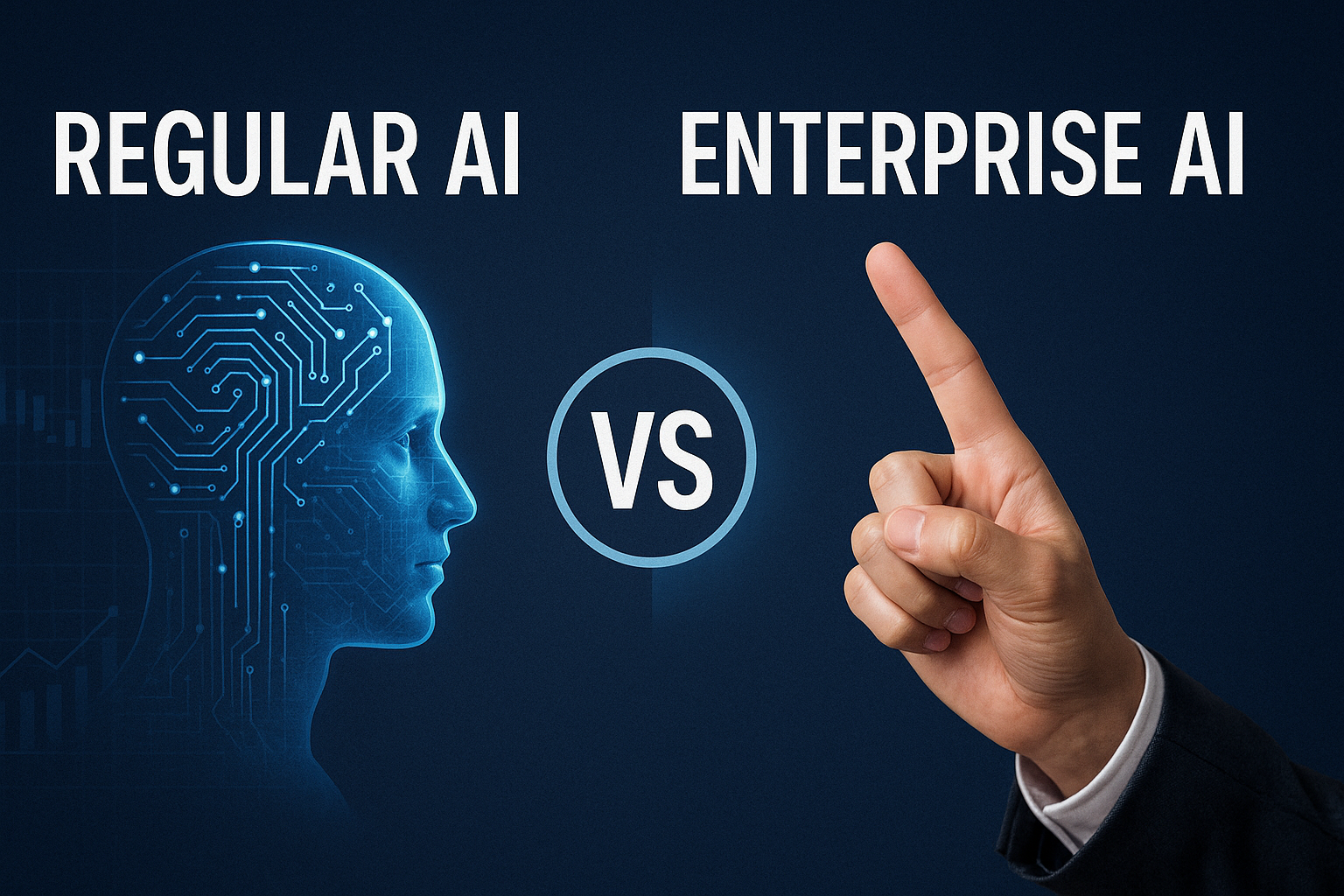Every business and industry today is using AI in some form. Whether it’s using chatbots or asking ChatGPT to summarize a PDF, AI helps businesses accomplish more in less time. With AI, businesses can accomplish more in less time.
For enterprises, their needs are different. They need AI solutions that will work on a larger scale and sort through massive amounts of data.
And the solution is Enterprise AI. This includes the integration of advanced AI technologies and techniques that improve business functions. It can help in managing complex tasks such as risk management, customer service, and automation.
This blog will be your complete guide to enterprise AI adoption.
Knowing the Basics: What is Enterprise AI?
Enterprise AI utilizes technologies like machine learning (ML), computer vision, and natural language processing (NLP) to help companies carry out their daily activities securely.
With enterprise AI, companies are capable of finding information like Key Performance Indicators (KPI) and improving their strategy better.
This helps organizations to pilot new ideas soon and rectify problems in a number of weeks instead of days. By implementing these technologies, businesses are capable of:
- Achieve process automation in various use cases
- Streamline intricate business functions
- Automate repetitive tasks
- Make the most of the data they accumulate.
Why Enterprise AI Matter?
Enterprise AI is transforming how companies operate and grow. The market for enterprise AI is also expanding, with an estimated worth of $150–$250 billion by 2030.
Key reasons why it matters:
1. Productivity Gains
64% of businesses expect enterprise AI to boost their overall productivity, as it automates complex workflows and routine tasks.
2. Market Penetration
49% of technology leaders have reported that AI is fully integrated into their core business strategy.
3. Cost Savings
Many enterprises have reported cost reductions in their business after they deployed AI, states a report by McKinsey.
4. Widespread Adoption
A growing share of medium and small-sized businesses have adopted AI in at least one of their functions.
Businesses that aren’t taking enterprise AI adoption seriously will be left behind. Traditional methods often fall short in predicting and managing the complexities of supply chains.
However, AI in the enterprise can anticipate disruptions and even predict future demands with accuracy. The same can be applied to healthcare and help the staff in flagging financial fraud and personalizing healthcare.
Difference Between Regular AI and Enterprise AI

Not all AI solutions are created equal. While regular AI is used for the general consumer, enterprise AI caters to bigger companies and their needs.
Regular AI refers to the general applications of artificial intelligence. These tools can be used by businesses but often have limited usage. Key features of regular AI include:
- Single Purpose: This is used to perform specific tasks like asking about the weather or making a trip itinerary.
- Limited Personalization: Regular AI has predefined functionalities. Which means there’s little room for customization.
- Simple Integration: These standalone tools don’t require integration with enterprise systems.
Check out the comparison table below to understand the differences better:
| Feature | Regular AI | Enterprise AI |
| Purpose | Single use | Multi use |
| Target Audience | General consumers or small- scale businesses | Enteprises |
| Customization | Limited | Highly customizable |
| Integration | Minimal | Deep integration with enterprises. |
| Data Security | Basic security | Advanced security with compliance focus |
| Scalability | Low | High |
| Example | Voice assistants and chatbots | Predictive analytics and process automation |
Core Benefits Of Enterprise AI for Businesses
Enterprise AI has fundamentally transformed how businesses work. As we know, it can streamline workflows and automate routine tasks. There are more benefits it has to offer, such as:
1. Security
AI algorithms can detect and respond to threats, often used to improve cybersecurity more efficiently.
2. Customer Support
Chatbots and virtual assistants can provide 24/7 assistance and improve customer experience.
3. Data Management
AI can analyze large volumes of data, help organize data, and provide an in-depth analysis of reports.
4. Error Prevention
It can also predict the outcomes, including the anomalies. Predicting these errors before they occur helps prevent downtime.
When your teams work faster and smarter with AI, inefficiencies will decrease. Especially when everyone is working on the same platform.
Adoption Challenges of Enterprise AI
Implementing AI in your enterprise comes with challenges and risks. Before you decide to go ahead with Enterprise AI adoption, keep these pointers in mind:
1. Ethical Responses
If not trained or monitored closely, it may discriminate against certain groups of people. Machine learning learns from historical data and can show up in the form of wrong answers.
2. Security Risks
You might accidentally provide sensitive information and increase the chances of a data breach. AI might provide copyrighted content without consent.
3. Job Redundancy
Businesses implementing AI must consider the implications for their workspace. Consider investing in retaining and reskilling your employees in the usage of AI.
Key Applications Across Industries
Several industries are relying on enterprise AI adoption. It has helped them solve industry- specific solutions and make better decisions.
1. Healthcare
AI is changing the way doctors offer diagnostics to their patients. By personalizing patient care, AI has helped doctors and staff monitor their patients better.
2. Finance
AI can easily identify fraud, conduct risk assessment, and improve customer engagement through personalized services.
3. Retail
With AI, eCommerce businesses are able to provide customized experiences for their customers. Through online behaviour, companies can keep track of what their customers like and ensure these products are present in the inventory.
In case your industry has specific requirements, find firms that deliver tailored custom AI solutions. These solutions are adaptable to your requirements.
Enterprise AI Trends to Look Out For
AI is evolving every single day. It’s getting more advanced and playing an important role for enterprises around the world. Here are the top 4 trends you need to look out for:
1. Explainable AI (XAI)
This refers to a collection of techniques that make the decision-making process transparent and understandable to humans. Unlike the traditional “black box” AI systems, XAI will provide clear insights on how they reached their conclusion.
2. AI for Cybersecurity
AI-powered cybersecurity systems will analyze large datasets from logs and cloud activities to identify suspicious activities. It can also be used to automate vulnerability management and conduct risk assessment.
3. Edge AI Adoption
AI is added close to the actual data source. This includes IoT devices and sensors. Edge AI can reduce bandwidth consumption and improve data privacy. These benefits are useful for healthcare and industrial automation.
4. Stronger AI Regulations
Since AI can give biased responses, stricter regulations are being laid out to promote fairness and safety. Regulations like EU AI Act focus on transparency and non-discrimination.
Future of Enterprise AI
The future predicts a remarkable growth of AI in the enterprise. Additionally, businesses will go deeper in integrating AI in their workflow.
AI assistants will continue playing an important part in the workspace to handle tasks like content creation and data analysis. AI will also be integrated virtually in all business workflows. Becoming AI literate will now be the new norm.
To stay ahead of this transformation, partnering with an AI development company can help businesses design tailored solutions, integrate AI responsibly, and scale efficiently. With expert guidance, enterprises can ensure that AI becomes a core enabler of innovation rather than a challenge to manage.
Conclusion
To sum up, AI in enterprise can assist businesses in their workflow. From managing invoices to summarizing massive datasets, AI has come a long way. While you can integrate AI into your workflow yourself, it can be a challenging path.
Implementing AI is more than just using a collection of tools; it requires a thorough understanding of AI strategies. Certain AI models can degrade and become less effective over time. That’s why it’s important to work with experienced professionals who can guide the implementation process.
With the right expertise, you’ll get maximum ROI and ensure new systems integrate smoothly with your existing setup.
Frequently Asked Questions
1. What is Enterprise AI?
Enterprise AI means using artificial intelligence to help big companies run better. It automates tasks, analyzes data, and helps teams make smarter decisions faster.
2. How can enterprise AI improve the efficiency of my business?
It can reduce how much work your team needs to perform by doing it for them. This allows your team to save time and focus on things requiring their undivided attention. It also identifies how your team can work better and new things by examining information.
3. What are some examples of Enterprise AI?
Examples include predictive analytics, fraud detection, automated customer support, and supply chain optimization. These tools help businesses save time and reduce errors.
4. Why should companies use Enterprise AI?
It helps in automating daily work, improving customer experience, reducing costs, and increasing overall productivity.
5. Is it hard to implement Enterprise AI?
It can be tricky because it needs the right data, tools, and planning. But with expert guidance and a clear strategy, the process becomes much smoother.
6. Can small businesses use Enterprise AI?
Yes, even small and medium-sized businesses can use enterprise-level AI tools to manage data, improve efficiency, and stay competitive.















